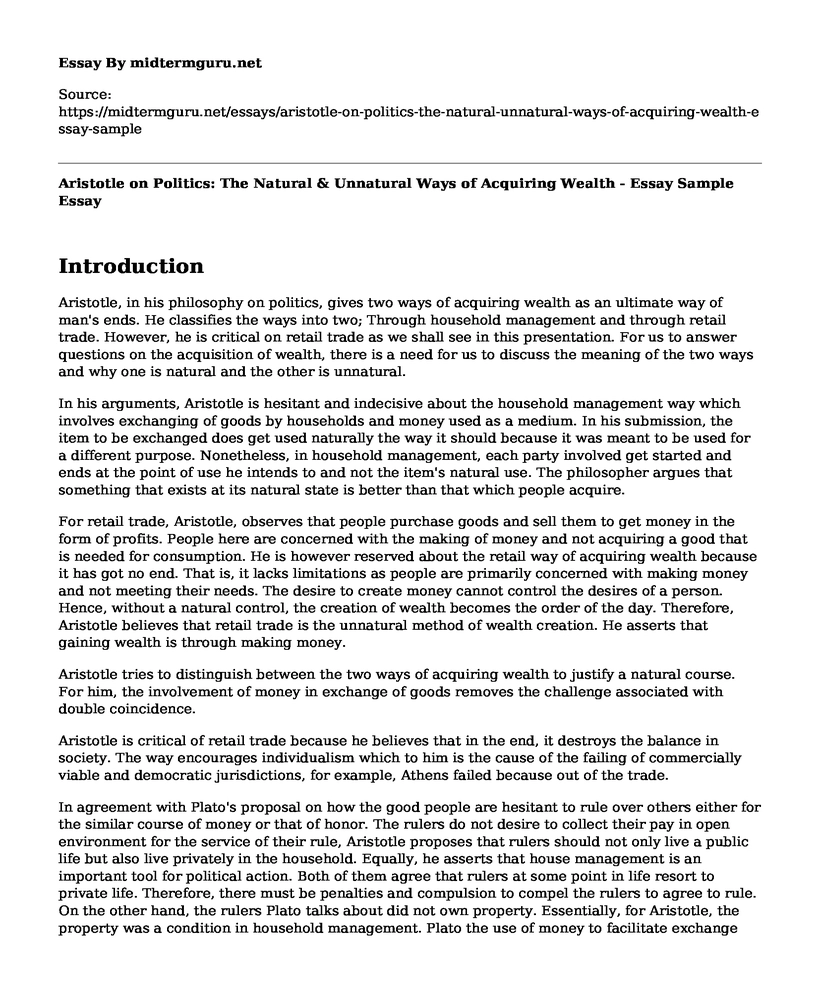Introduction
Aristotle, in his philosophy on politics, gives two ways of acquiring wealth as an ultimate way of man's ends. He classifies the ways into two; Through household management and through retail trade. However, he is critical on retail trade as we shall see in this presentation. For us to answer questions on the acquisition of wealth, there is a need for us to discuss the meaning of the two ways and why one is natural and the other is unnatural.
In his arguments, Aristotle is hesitant and indecisive about the household management way which involves exchanging of goods by households and money used as a medium. In his submission, the item to be exchanged does get used naturally the way it should because it was meant to be used for a different purpose. Nonetheless, in household management, each party involved get started and ends at the point of use he intends to and not the item's natural use. The philosopher argues that something that exists at its natural state is better than that which people acquire.
For retail trade, Aristotle, observes that people purchase goods and sell them to get money in the form of profits. People here are concerned with the making of money and not acquiring a good that is needed for consumption. He is however reserved about the retail way of acquiring wealth because it has got no end. That is, it lacks limitations as people are primarily concerned with making money and not meeting their needs. The desire to create money cannot control the desires of a person. Hence, without a natural control, the creation of wealth becomes the order of the day. Therefore, Aristotle believes that retail trade is the unnatural method of wealth creation. He asserts that gaining wealth is through making money.
Aristotle tries to distinguish between the two ways of acquiring wealth to justify a natural course. For him, the involvement of money in exchange of goods removes the challenge associated with double coincidence.
Aristotle is critical of retail trade because he believes that in the end, it destroys the balance in society. The way encourages individualism which to him is the cause of the failing of commercially viable and democratic jurisdictions, for example, Athens failed because out of the trade.
In agreement with Plato's proposal on how the good people are hesitant to rule over others either for the similar course of money or that of honor. The rulers do not desire to collect their pay in open environment for the service of their rule, Aristotle proposes that rulers should not only live a public life but also live privately in the household. Equally, he asserts that house management is an important tool for political action. Both of them agree that rulers at some point in life resort to private life. Therefore, there must be penalties and compulsion to compel the rulers to agree to rule. On the other hand, the rulers Plato talks about did not own property. Essentially, for Aristotle, the property was a condition in household management. Plato the use of money to facilitate exchange cannot be objected while Aristotle has a different view concerning money. He is objected to the acquiring of money for its sake is not natural.
Conclusion
In conclusion, Aristotle's claims of wealth creation as in private ownership is not only for an individual but for the wellbeing of all in the society (what he refers to as an 'Ideal' city). The ownership is for use which in essence is common. This implies that every member of an ideal city has a private office through which he uses to serve other people in society. Through the services, all members of the society live well.
Cite this page
Aristotle on Politics: The Natural & Unnatural Ways of Acquiring Wealth - Essay Sample. (2022, Dec 27). Retrieved from https://midtermguru.com/essays/aristotle-on-politics-the-natural-unnatural-ways-of-acquiring-wealth-essay-sample
If you are the original author of this essay and no longer wish to have it published on the midtermguru.com website, please click below to request its removal:
- Reflection on the Constitution Day
- Essay on Identification and Description of Niccolo Machiavelli
- Paper Example on U.S. History Reconstruction and the Age of American Imperialism
- Essay Sample on Mining and the Need of Minerals
- Essay Sample on Strategies Employed by White Settlers to Legitimately Occupy Indian Land
- Pre-Fabricated Housing Policy - Essay Sample
- Changes & Growth From US Civil War: Government Reorganization & Economy - Essay Sample







